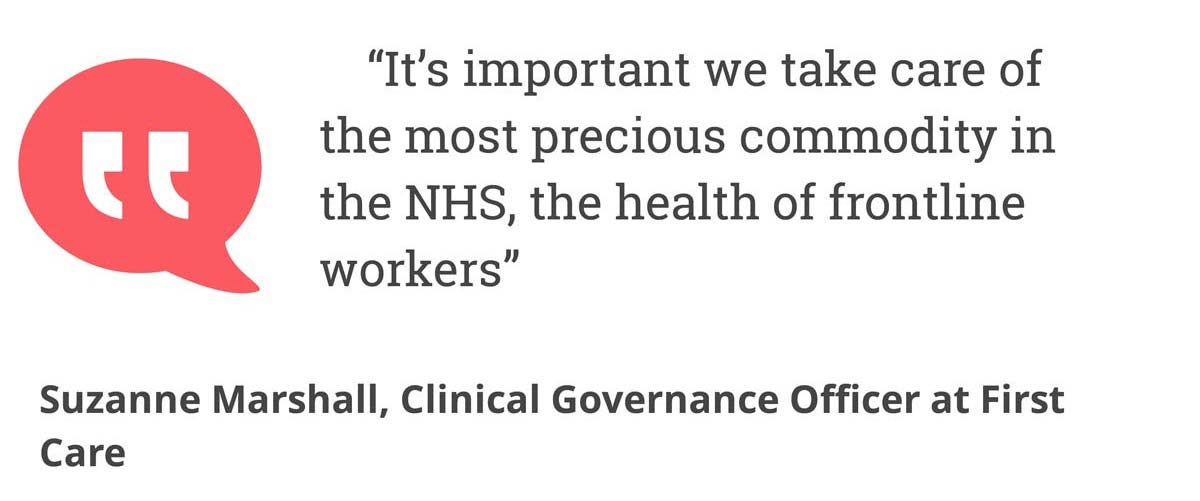- 19 August 2021
- 3 min read
Will Increased Mental Health Absences In NHS Staff Be A Wake-Up Call For The Government?
Subscribe Will Increased Mental Health Absences In NHS Staff Be A Wake-Up Call For The Government?
Will Increased Mental Health Absences In NHS Staff Be A Wake-Up Call For The Government?New data suggests mental health-related absences amongst NHS workers increased by more than a third over the past months. Concerns had repeatedly been raised over staff wellbeing during the winter surge of COVID cases.
The latest figures indicate there was a 37% increase in the number of mental health-related absences throughout the NHS between February and June 2021.
The data also showed that approximately 4,000 more staff were off work because of their mental health in June 2021 when compared with the same time last year.
What measures could the government be taking now, before the NHS comes under increased pressure again during the autumn and winter months?
In February this year, the organisation First Care, which collates information regarding the NHS workforce across the UK, estimated there were around 9,500 staff off work due to mental health concerns. By June, this figure had increased to more than 13,000.
The largest month-on-month increase was recorded between April and May 2021, when mental health-related absences grew 20% – from around 10,800 to more than 12,900.
To what extent could the disruption brought about by being required to self-isolate due to COVID rules, coupled with the resultant staffing shortages, have contributed to pressure on NHS workers’ mental health?Between February and June 2021, the NHS lost an estimated 885,000 workdays to mental health-related reasons. This is in comparison to 472,000 sickness days due to Covid-19 or other medical reasons.
The costs of lost working time due to poor staff mental health have been estimated at a minimum of £149million so far in 2021.
Given the perennial demands for more funding for the NHS, how seriously do you expect the Government and NHS leaders to look at minimising such costs going forward?
During the first peak of the pandemic in April 2020, 10,374 NHS staff were recorded absent because of their mental health. In April 2021 this figure was 10,801, an increase of 4%.
The biggest increases however were seen year-on-year. Comparing May 2020 to May 2021, there was a 55% increase in mental health-related absences. Absences also increased by 42.4% from June 2020 to 2021.
Now the NHS faces added pressure due to a growing patient backlog, what can be done in the short-term to relieve some of the stress on NHS workers?A survey conducted by Nursing Times in March 2021 found almost two-thirds of nurses felt their mental health had suffered since the initial peak of the pandemic and that the wellbeing support available is not sufficient.
What longer term support infrastructure would you like to see put in place to avoid higher levels of staff absence and eventual burn-out?
Interim deputy director of nursing, policy and public affairs at the RCN, Matthew Barker said: “The past year has taken a great toll on the nursing teams’ wellbeing; many are telling us they have no more reserves and don’t know how they will continue at this pace."
“The added pressure and emotional trauma experienced by all nursing staff, whatever setting they are working in, means there is a very clear need for them to have easy access to support now and in the future. Our health and care services can’t afford to lose any member of the nursing team” he added.

Do you think the increasing numbers of students enrolling on nursing courses this year will be enough to offset losses of staff due to mental health issues? Or does more need to be done in the here-and-now?
Should there be an increased focus on staff welfare, given that with so many vacancies currently unfilled in the NHS, the health service can ill afford to lose any staff members?
Please let us know what you think in the comments, and Like the article if you found it interesting.
Thanks.







About this contributor
Nurses.co.uk Founder
I launched Nurses.co.uk (and subsequently Socialcare.co.uk, Healthjobs.co.uk and Healthcarejobs.ie) in 2008. 500 applications are made every day via our jobs boards, helping to connect hiring organisations recruiting for clinical, medical, care and support roles with specialist jobseekers. Our articles, often created by our own audience, shine a light on the career pathways in healthcare, and give a platform to ideas and opinions around their work and jobs.
More by this contributorWant to get involved in the discussion?
Log In Subscribe to commentPatricknurse Corrigan
Patricknurse Corrigan
3 years agoIn the early part of the 20th century. Nurses were treated as Angels. They were badly paid. Treated by society ... read more
In the early part of the 20th century. Nurses were treated as Angels. They were badly paid. Treated by society in a respectual manner. Today nurses attend university and like their previous colleagues are well trained and have become more responsible for their practice. No longer the handmaid of the Doctor. The NHS must now take full responsibility for the duty of care of all health care professionals especially front line Nursing staff. Standing, clapping Nurses while laudable is not sufficient to protect Nurses. It is about time the profession and the Government protected their staff and took appropriate steps to help them. Otherwise recruiting staff into nursing will continue to be a major problem. Patrick Corrigan, MSc., MA. R. M. N. Retired.
read less
Thank you Patrick for your considered response.
Rajen Jussun
Rajen Jussun
3 years agoThere are a lot of measures that the Government need to take in order to remedy the chronic shortage of ... read more
There are a lot of measures that the Government need to take in order to remedy the chronic shortage of nursing and support staff in the NHS. I can only give an outline of such proposals which needs to be discussed in more details and they are: 1 Change the way Nurse training is done at the moment. continue to train graduate / diploma nurses for individuals with academic qualifications such as ' A.L' and who intend to pursue a career in Nursing at advanced clinical or management level. There should be a second level of nursing for those individuals who do not have academic qualifications or only GCSE. This particular level of practice will deal only with clinical aspects of nursing and suitable for individuals who have no inclination of pursing academic education. For those attending Universities for Degree level, the student loan should be discarded and full grant provided. For the assistant nurse positions, the candidates should have a 6 months to 1 year combined classroom and clinical placement and a further year practical under supervision with either a salary or Grant to cover living and travelling expenses. The NHS should also maintain the support ancillary staff for personal care. I believe that as there are unemployment in some countries that the NHS should finance the training of nurses and assistant nurses abroad and bring them to work in the UK for a salary for a minimum of 3-5 years. The present salary Banding should continue but the hourly rate and enhancement should be revised to match what the private sector is paying. The NHS should provide flexible contracts to people with childcare and other family care responsibilities. Those who prefer to work with Nurse Agencies should be attracted to work as consultants to give them the flexibility of work and family life. All training costs should be borne by the NHS. The above measures will work well within an integrated Nursing and Social care model. The present system is management oriented and expensive and not cost effective.
read less
Thank you for your contribution Rajen.